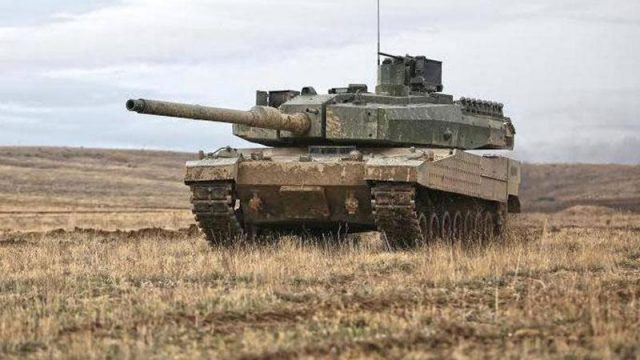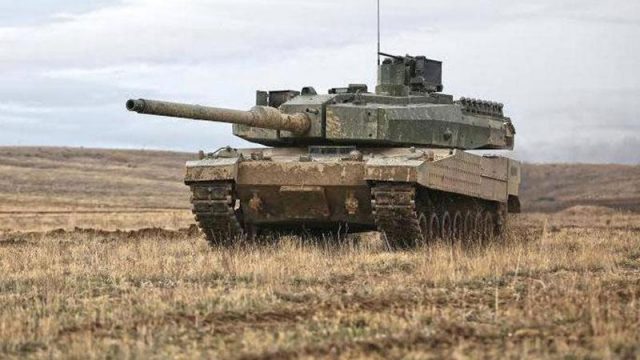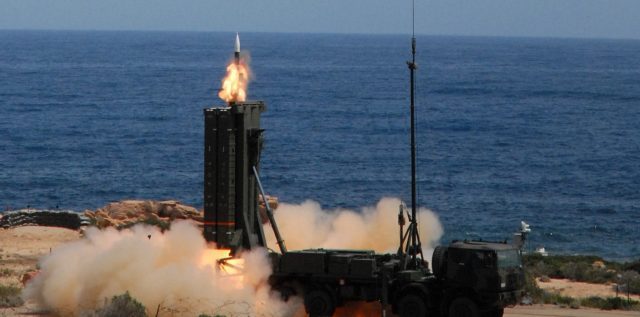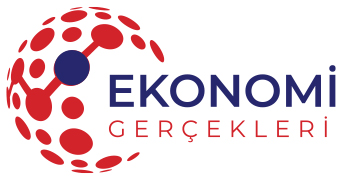Dünyanın en büyük krallığını hayal edin… Küplere doldurulmuş altınlar odalarda sere serpe yatıyor. Krallığın bu altınların sahibi olduğunu ispat edebilmesi için ve bu mülk üzerinde hak iddia edebilmesi için, ona sahip çıkması ve gelebilecek her türlü zarara karşı onu koruyabiliyor olması gerekmez mi?
Ülkelerin ekonomik ve siyasal alandaki gücünü belirleyen aktörlerden biri olan savunma sanayiinde, dünyada yaşanan teknolojik gelişmelere paralel olarak değişime ihtiyaç duyulmaktadır. Bir ülkenin zengin olması da, az gelişmiş veya gelişmiş olması da savunmaya duyduğu ihtiyacı değiştirmez. Ki zaten ne kadar gelişmiş olduğunuz da bir ölçekte kendinizi ne kadar savunabildiğinizle ilgilidir.
Türkiye’nin jeopolitik konumundan kaynaklı sürekli sıcak bir atmosfer içinde olması ve aynı zamanda yurtiçinde teröre karşı verilen mücadele lojistik açıdan gelişmeyi zorunlu kılıyor. Sadece doğal kaynağa veya ticarete dayalı ekonominizin olması, savunma sanayinde belli bir noktaya ulaşamamışsanız bağımsızlığınızı koruma garantisi vermiyor.

Malum artık savaşlar kılıçlarla ve kelle başı hesaplarla yapılmıyor. Ancak yine de hepimiz nükleer silah tehdidi gerekçe gösterilerek ülkelerin işgal edildiğine şahit oluyoruz. İşte tam da bu nedenle bir ülkenin savunma sanayiine yaptığı yatırım kritik önem taşıyor. Ve tabiri caizse bu çaba “dış mihrakların” pek sıcak karşılamadığı bir gelişme olarak kaydediliyor. Dolayısıyla uluslararası sistemin durumu savunma sektörüne stratejik bir değer katıyor. Ülkemizin jeopolitik konumu gereği teşkil ettiği önem ortadayken, Türk Savunma Sanayisi de, Türk Silahlı Kuvvetleri’nin ihtiyaçlarını karşılamaya ve rekabetin had safhaya ulaştığı uluslararası pazarlarda ağırlığını hissettirmeye başlıyor.
Kendi silahını üretememe meselesi bir ülkeyi dışarıya bağlayan unsurlardan biri. Aslında durum ABD’den silah alan bir ülkenin, silahı kullanırken bile ona sormasından ibaret. Peki, Türkiye böyle krizler yaşamadı mı? 1964 yılında Kıbrıs’ta yaşanan karmaşanın ardından İnönü Kıbrıs’a müdahale edileceğini ABD elçiliğine haber vermişti. ABD Başkanı Johnson ise İnönü’ye aşağılayıcı nitelikte bir mektup yazmıştı. Öyle ki bu mektup Türkiye dış politikasının dönüm noktalarından biri haline gelmişti. Türkiye mektup sayesinde kendi ulusal çıkarlarının Batı ile ama özellikle de ABD’nin çıkarlarıyla çeliştiği noktada bağımsız politikalar geliştirme konusunda sıkıntılar yaşanabileceğini gördü. Yeterli silahı olmayan ve kendisini ABD bloğuna bağlayan Türkiye, ABD’nin kimi zaman kendisini yalnız bırakabileceğini bu hadiseyle gördü.
Küresel silah endüstrisine baktığımızda ABD şirketlerinin egemen olduğu görüyoruz. Amerikan şirketlerini Ruslar izliyor. Türkiye ise, 2017’de küresel silah endüstrisinde atağa geçen ülkeler arasında yer alıyor. Stockholm Uluslararası Barış Araştırmaları Enstitüsü’nün (SIPRI) raporuna göre, Türk silah şirketleri 2017’de satışlarını yüzde 24 arttırdı, ASELSAN ile Türk Havacılık ve Uzay Sanayii ilk 100 şirket arasına girdi. SIPRI’nın Silahlar ve Askeri Harcama Programında görevli araştırmacı Pieter Wezeman bu gelişmeyi, “Bu önemli artış, silahlara artan talebi karşılamak ve yabancı tedarikçilere daha az bağımlı olmak amacıyla silah endüstrisini geliştirme heveslerini yansıtıyor.” şeklinde yorumluyor.

Türkiye savunma sanayi son yıllarda yaptığı atakla birçok alanda başarılı projeler gerçekleştirmeyi başardı. Cumhurbaşkanı Erdoğan’ın açıkladığı 2023 hedefleri arasında da yer alan milli tank, milli uçak ve milli uydu projeleri devletin büyük kararlılığı ile devam ediyor. Türkiye, yer aldığı bölgede liderlik iddiasını artıracak projelere imza atıyor. Bu projelerin üretildiği başlıca kurumlar; ASELSAN, İŞBİR, ASPİLSAN, HAVELSAN, ROKETSAN TUSAŞ. Savunma sanayiimizi besleyen bu çalışmalar son on beş yılda meyvelerini vermeye başladı. Ancak, bu projelerin hız kesmeden devam ettiğinden ve yerli üretimin tam manasıyla gerçekleşmesi için ortaya koyulan gayretten özellikle bahsetmek gerekiyor. Bahsettiğimiz bu kurumlar, Türkiye Savunma Sanayii için kilit bir rol üstleniyorlar. Öyleyse, savunma sanayiinin son yıllarda geliştirdiği yerli üretimlerden bazılarına göz gezdirelim.
Önce havacılıktan başlayalım. Zira son dönemde bu alanda kaydedilen başarılar ses getiriyor. Türk Silahlı Kuvvetleri’nin operasyonlarda kullanacağı askeri helikopter ihtiyacının karşılanması gerekiyordu. Bu ihtiyaç göz önünde bulundurularak TEI’nin çalışmalarıyla Atak helikopteri projesi gerçekleşti. 2007’de imzalanan bir sözleşmenin ardından harekete geçildi. Bugün Atak helikopteri sorunsuz şekilde üretiliyor. Aynı zamanda helikopter, tek kalemde en büyük savunma sanayi ihracatının yapıldığı ilk üretim. ATAK Helikopteri’nin üretiminde elde edilen tecrübe ile üretilen Gökbey helikopteri de hem sivil hem askeri havacılık için kullanılmak üzere seri üretime geçecek.
Savunma sanayiinin odaklandığı bir diğer alan ise füze yapımı. Üretilen füzelerden biri olan “Cirit” Roketsan tarafından tasarlandı. Füze, helikopterlere, insansız hava araçlarına, kara araçlarına, sabit kara platformlarına, hafif saldırı uçaklarına ve deniz platformlarına entegre edilebilir şekilde tasarlanmasından dolayı etkin olarak kullanılabiliyor. Tübitak Sage ve Roketsan’ın birlikte geliştirdiği SOM füzelerinden biri olan SOM-J ise, yoğun şekilde korunan kara ve deniz hedeflerine karşı kullanılabilecek en etkili mühimmat olma özelliğini taşıyor. Orta menzilli bir füze olan SOM-J’nin üretim amacı havadan karadaki hedefleri imha etmek. Yine Roketsan tarafından üretilen Kaan füzesi manevra birliklerine ateş desteği sağlamak amacıyla üretiliyor. Üretilen füzeler arasında Kasırga, Bora, Umtas, Omtas, Hisar gibi füzeler yer alıyor.
Diğer nokta ise Koç Grubu’na bağlı Otokar’ın ana yüklenicisi olduğu Altay tankı projesi. Projeye 2007 yılında başlandı. Prototip üretimi ve testleri tamamlanan Altay tankı, ilk etapta 250 adet üretilecek. Bu rakam, ihracat potansiyelinin artırılması ve dışarıdan sipariş alınmasıyla zaman içinde binli rakamlara çıkarılabilecek.
Cumhurbaşkanı Recep Tayyip Erdoğan da “15 yıl önce göreve geldiğimizde Savunma sanayi olarak bu mevcut yapı ne yazık ki yoktu bizler o zaman yüzde 20 gibi bir oranda imkânlara sahiptik ama şu anda yüzde 65 gibi bir orana çıktık.” söylemiyle gelinen noktaya vurgu yapıyor. Erdoğan’ın da belirttiği gibi, sadece belli başlı üretimlere değinsek de savunma sanayiinin kat ettiği aşama, sürekli olarak altı çizilen yerli ve milli olma meselesi bakımından son derece önemli. Türkiye artık savunma sanayii teknolojilerinin geliştirilmesi nezdinde daha ileri bir noktada ve bu ilerleme hız kesmeden devam ediyor. Çünkü geleceğe sahip çıkmak, hiçbir dala tutunmadan ayakta durabilmek demektir.
[:en]
Imagine the greatest kingdom in the world. Inside its chambers, there are pots are overflowing with gold. In order for this kingdom to prove that it is the rightful owner of its gold and to lay claim to such wealth, wouldn’t it be necessary for it to preserve and defend its treasure from threats of all sorts?
The defense industry, one of the main actors defining the economic and political prowess of a country, has the need to evolve in accord with the technological advances as they appear. A country’s level of wealth, or its state of development does not affect its need to defend itself in either way. Moreover, it would be safe to say that a country’s competence in defending itself defines how developed it actually is, in one respect.
Because of its geopolitical position in the region, Turkey is in a perpetually hot-zone, it is also in a constant struggle against domestic terrorism, thus it proves crucial for it to improve in logistics. An economy depending on trade or natural resources does not warrant a country’s independence by itself, unless a certain level of strength in defense industry is achieved.
It is certain that wars aren’t anything like they used to be today, not only are they not fought with swords anymore, but also the number of troops don’t have much to say in victory. Yet, we all witness countries getting invaded nonetheless, justified by nuclear weapon threats. It is for this very reason investments in defense industry is critical for a country’s future. And this mostly results in “foreign forces” to show some discontent, so to speak. Therefore, the current state of the international system adds a strategic value to the defense industry. Turkey’s significance in the region is clear owing to its geopolitical position, and now, Turkish defense industry is proceeding to make its presence felt in international markets where competition is in the name of the game.

The inability to produce its own weapons is one of the main factors rendering a country foreign-dependent. Let’s say a certain country buys weapons from the U.S., the former pretty much has to ask the latter for permission in order to use them, and this is what the situation boils down to. All right, but hasn’t Turkey ever been through such crises in the past? After the 1964 Cyprus crisis, İnönü had informed the U.S. that Turkey was to intervene. Consequently, President Johnson wrote a letter of condescending nature to İnönü. So much so that the letter can be regarded as a turning point in Turkey’s foreign policy. The letter helped the country realize that if their interests were to contradict with the West, and especially with the U.S., it could cause a lot of issues in developing independent policies. Thus, the incident demonstrated the U.S. could very well leave Turkey all alone when it sees fit, and this meant an issue of considerable magnitude to the latter, as it was lacking in weaponry and was dependent to the former.
Taking a look at the global arms industry, it is clear the U.S. companies dominate the market, with Russians following right behind. Turkey, on the other hand, has been working relentlessly on the industry since 2017. According to the report published by Stockholm International Peace Research Institute (SIPRI), Turkish arms companies have increased their sales by 24 percent in 2017, while ASELSAN and Turkish Aerospace ranked among top 100 companies. Pieter Wezeman, senior researcher with the SIPRI Arms Transfers and Military Expenditure Programme, interprets this development stating: “This significant increase reflects Turkey’s ambitions to develop its arms industry to fulfil its growing demand for weapons and become less dependent on foreign suppliers.”
In recent years, Turkish defense industry has managed to propel itself with great vigor and develop numerous projects of considerable success. President Erdoğan’s 2023 vision comprises national tank, plane and satellite projects, all of which are being carried out with serious commitment by the state. Turkey is developing such projects to further validate its claim of leadership in the region. The principal corporations in the game can be listed as, ASELSAN, ISBIR, ASPILSAN, HAVELSAN, Roketsan and Turkish Aerospace. Such endeavors to improve Turkish defense industry have started to bear their fruits over the last fifteen years. Also, it is crucial to mention the extent of efforts necessary for these projects to proceed non-stop in order to realize complete domestic production. The aforementioned corporations play a key role for Turkish defense industry. In that case, let us take a glance at the domestic production results the defense industry has brought about in recent years.

We’ll begin with aviation, as the achievements in the field are making a tremendous impression lately. Turkish Armed Forces needed a military helicopter to utilize in its operations. Bearing this in mind, and owing to TEI’s extensive efforts, the project ATAK helicopter was realized. The program has commenced after the contract was signed in 2007. Today, the ATAK helicopter is being produced without hassle. In addition to this, the helicopter marked the first ever largest single-item export of the defense industry. With the experience acquired during the production of ATAK, the new Gökbey helicopter will soon go into mass production to be used in both civil and military aviation.
Yet another focal point of the defense industry is manufacture of missiles. One of the missiles in production, dubbed “CİRİT”, was designed by Roketsan. The laser guided missile was designed to be readily integrated into various platforms such as helicopters, UAVs, land vehicles, fixed land platforms, close air support aircrafts, and naval platforms. This makes it highly efficient to use. SOM-J, a stand-off missile developed in a joint-effort between Tübitak SAGE and Roketsan, holds great significance too, as it was designed to be the most effective missile for use against heavily defended land and sea targets. A medium-range missile, SOM-J is produced with the objective of destroying predefined land targets from air. Kaan is yet another missile manufactured by Roketsan, and it is designed to provide fire support to maneuvering units. Kasırga, Bora, UMTAS, OMTAS, and HİSAR are also among the missiles produced.
Another point of interest is the Altay battle tank project, undertaken by Otokar, one of the companies of Koç Group. The project has commenced in 2007. The prototypes completed qualification tests successfully, and an initial batch of 250 tanks are to be manufactured. In time, these numbers are expected to hit thousands as the export potential increases and foreign orders are made.
Recep Tayyip Erdoğan, the President of Turkey, emphasizes where the country stands now, stating: “When we took office 15 years ago, things were very different from the current state of the defense industry. At the time, our independent production was limited to about 20 percent, while the figures have increased to 65 percent since.”
Just as Erdoğan asserts, even though we could only go as far as to mention a limited number of projects here, the progress the defense industry has made is extremely important, highlighting national endeavors and domestic production. Today, Turkey is in a much better condition to develop more advanced technologies in the defense industry, and it does not cease progressing rapidly. Because, if a country wants to protect its existence and its future, it must first learn to stand tall on its own.
